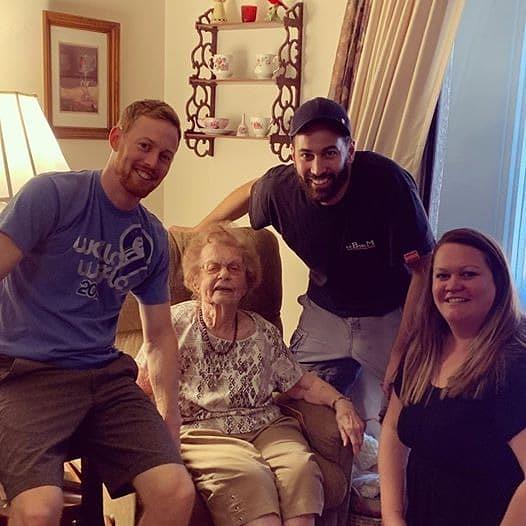
Grandma Ruth is turning 100 on April 7, which was to be the day my boyfriend’s family had planned a reunion of 100 people in her honor. In light of COVID-19, she will be alone in her senior living complex in Phoenix, AZ. The decision to cancel Grandma Ruth’s seminal celebration was obvious, but the toll that and thousands of other cancellations take on seniors is also very real.

Increasing isolation and loneliness are a serious concern, where a quarter of older adults were already socially isolated before COVID-19. Seniors represent the most vulnerable group to COVID-19. As the pandemic spreads, many seniors and their families have to weigh the trade-offs of distancing tactics, with heartbreaking stories daily of families desperate to make contact with their loved ones in a safe way, sometimes peering through glass just to catch a glimpse. Social distancing and quarantines are still among the best tools we have to protect against the spread of disease, yet it’s often not a simple decision.
Mon Ami was founded in 2018 to combat the already serious epidemic of social isolation among seniors, which is not merely sad and unpleasant. Studies show that social isolation brings negative health consequences worse than obesity, diabetes or smoking 15 cigarettes a day. At the very moment when our senior loved ones need it most, we have had to make the difficult decision to cancel all in-person visits with our college student companions. The families of our clients understand this decision but worry about what happens when that one visit a day that motivates Mom to get out of bed disappears. While we don’t have a perfect alternative, we know we as a community have to weave together compassion, creativity, and technology to address an unprecedented challenge in record time.
So while this pandemic affects us all, let’s consider the impact of ‘social distancing’ on those most vulnerable and pitch in to make it a little easier for our neighbors, family and friends, and other elders across the country. You don’t need to have a grandmother in a nursing home to show someone you care.
Here are just 5 ways you can help seniors:
- Sign up to be a volunteer caller with our Phone Bank and call a senior isolated by COVID-19. Anybody can provide social support. Similarly, if you know a family member or loved one who is isolated, you can help sign them up to receive calls. It’s not just a one-time thing either. People will need support for the weeks or months to come. The phone bank ensures seniors get calls on a regular basis from the same person, building a new and meaningful connection in a moment of crisis.
- Identify the needs in your neighborhood: Who needs groceries? Who needs to pick up a prescription? Who needs help walking a dog? Vulnerable groups should stay at home as much as possible,so if you are healthy, offer to help others run their essential errands. Join NextDoor, which is similar to Facebook but for your neighborhood, to offer help or to find out which of your neighbors could use help. Alternatively, for seniors who may not be on social media, do it the old fashioned way and go door-to-door with your contact info.
- Provide letters and care packages: While most nursing homes and senior living facilities are closed to external visitors, they can still accept packages. Call your local senior living facility and ask what their residents might appreciate in the form of a care package. Deliver yourself or send it through the mail.
- Donate your iPad or other tablets to a senior living facility: Access to technology might be a barrier for seniors who would like to video conference with their family members or others. Reset your device and install a video conference system like Zoom and send it with easy instructions on how to get started. The facility can also sign up to participate in the Phone Bank to receive calls from volunteers.
- Reach out to family or friends who are caregivers to seniors: Over 40 million people in the US provide care to a senior. Chances are, if you’re not already a caregiver, you know someone who is. They may be stressed or worried. Their caregiving job, and any other professional job, just got a lot harder. Tell them you are thinking of them and offer to do any of the above for their loved one. Offer to run any of their errands. Caregiving can be one of the hardest and loneliest jobs, and in this time of increased uncertainty, a little kindness and compassion can go a long way.
Though social isolation is most dramatic for seniors, we all need human connection. The already serious problem of social isolation that preceded COVID-19 has precipitously accelerated to full-on crisis. The dangers of exposure to COVID-19 are real and scary. The extreme isolation that comes with it makes a bad situation worse. With this challenge is a tremendous opportunity to establish and nurture relationships using technology and old-fashioned neighborly care that is the lifeblood of healthy communities. At Mon Ami, we’re going to keep working on new and innovative approaches during this crisis. Please share your ideas with us too. We look forward to getting through this together and building more happy and healthy human connections than ever before.
By: Joy Zhang, Co-Founder, Mon Ami